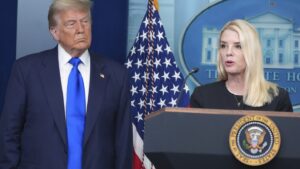The Dictatorship
Trump’s attacks on media echo authoritarians who silence dissent
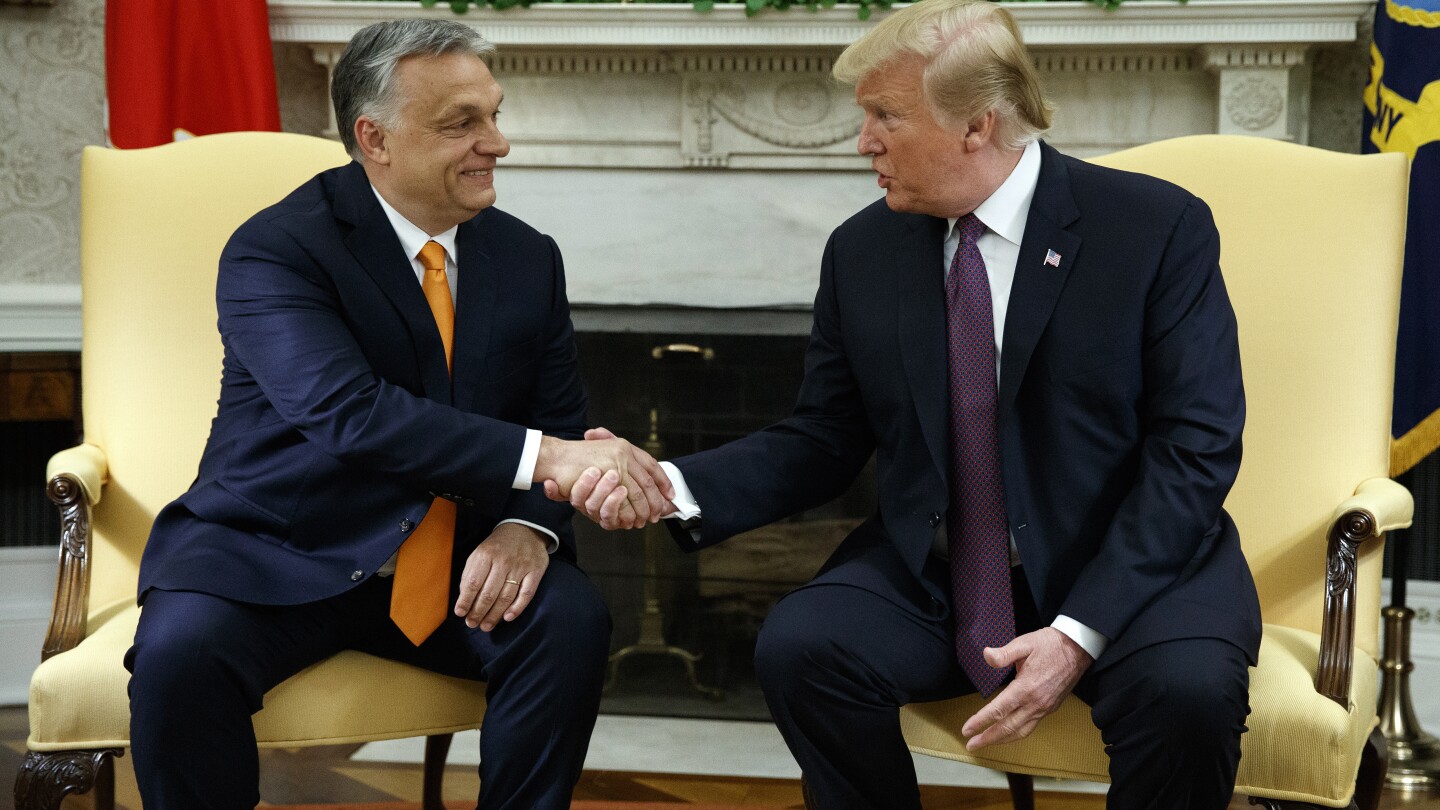
BUDAPEST, Hungary (AP) — Since taking office in January, President Donald Trump has waged an aggressive campaign against the media unlike any in modern U.S. history, making moves similar to those of authoritarian leaders that he has often praised.
On Wednesday, Trump cheered ABC’s suspension of Jimmy Kimmel’s late-night show after the comedian made remarks about the assassination of conservative activist Charlie Kirk that criticized the president’s MAGA movement: “Congratulations to ABC for finally having the courage to do what had to be done,” Trump wrote on his Truth Social platform.
It was the latest in a string of attacks against news outlets and media figures he believes are overly critical of him. Trump has filed lawsuits against outlets whose coverage he dislikesthreatened to revoke TV broadcast licenses and sought to bend news organizations and social media companies to his will.
The tactics are similar to those used by leaders in other countries who have chipped away at speech freedoms and independent media while consolidating political power, including Hungarian Prime Minister Viktor Orbán, a close Trump ally whose leadership style is revered by many conservatives in the U.S.
“What we’re seeing is an unprecedented attempt to silence disfavored speech by the government,” said Brendan Nyhan, a political scientist at Dartmouth College. “Donald Trump is trying to dictate what Americans can say.”
Is Trump taking cues from Orbán?
Trump’s approach to governing has drawn comparisons to Orbánwho has been in power since 2010. The Hungarian leader has made hostility toward the press central to his political brand, borrowing Trump’s phrase “fake news” to describe critical outlets. He has not given an interview to an independent journalist in years.
Media watchdog Reporters Without Borders says Orbán has built “a true media empire subject to his party’s orders” through allies’ acquisitions of newspapers and broadcasters. The group says that strategy has given Orbán’s Fidesz party control of about 80% of Hungary’s media market. In 2018, Orbán’s allies donated nearly 500 news outlets they had acquired to a government-controlled conglomerate, a group that included all of Hungary’s local daily newspapers.
Opposition parties complain that they get just five minutes of airtime on public TV during elections, the legal minimum, while state broadcasters reliably amplify government talking points and smear Orbán’s political opponents. Hungary’s media authority, staffed entirely by Orbán’s party nominees, has threatened nonrenewal of broadcast frequencies to keep outlets in line and forced the liberal-leaning station Klubrádió off the air.
“Here, they bought outlets and replaced editorial staff wholesale,” said Hungarian media analyst Gábor Polyák.
The moves against independent media, along with Orbán’s systematic capture of Hungary’s democratic institutions, prompted the European Parliament in 2022 to declare that the country could no longer be considered a democracy.
Polyák said that while the American media landscape is far larger and more diverse than Hungary’s, he’s been struck by the willingness of major U.S. companies to accommodate Trump’s threats.
“There is a very strange kind of self-censorship in America,” he said. “Even with European eyes, it is very frightening to see to what degree individual bravery does not exist. From Zuckerberg to ABC, everyone immediately surrenders.”
Kimmel suspension is part of a pattern by Trump
Kimmel became the second late-night comic with a history of pillorying Trump to lose their show this year. CBS canceled Stephen Colbert’s show just days after he had criticized the network’s settlement of a lawsuit filed by Trump over its editing of a “60 Minutes” interview with former Vice President Kamala Harris, Trump’s opponent last fall.
CBS said the July move was made for financial reasons, but Trump celebrated it nevertheless while appearing to foreshadow this week’s developments: “I absolutely love that Colbert got fired. His talent was even less than his ratings,” he wrote on his social media platform at the time. “I hear Jimmy Kimmel is next.”
People walk by the Jimmy Kimmel Live studio on Hollywood Blvd., Wednesday, Sept. 17, 2025, in Los Angeles. (AP Photo/Chris Pizzello)
People walk by the Jimmy Kimmel Live studio on Hollywood Blvd., Wednesday, Sept. 17, 2025, in Los Angeles. (AP Photo/Chris Pizzello)
ABC’s suspension of Kimmel on Wednesday came after Federal Communications Commission Chairman Brendan Carr made a pointed warning about the comedian on a conservative podcast earlier in the day: “We can do this the easy way or the hard way,” he said.
Carr also launched an investigation into CBS and opened probes into public broadcasting networks after Trump persuaded Congress to defund them.
The Kimmel suspension has highlighted the president’s broader efforts to pressure journalistsmedia companies, and now comedians and commentatorsto align with his views. On Thursday, as he returned from Great Britain, Trump said regulators should consider revoking the licenses of networks that provide what he considers “only bad publicity.”
Trump also has targeted social media giants, claiming Meta dropped its fact-checking program partly because of his threats, which included jailing founder Mark Zuckerberg.
Even powerful media owners have appeared to bend under pressure. Washington Post owner Jeff Bezos, whose companies have significant government contracts, killed an editorial endorsement of Democratic nominee Kamala Harris before the 2024 election and, like Meta, donated $1 million to Trump’s inauguration. Disney-owned ABC News agreed to a $15 million settlement to resolve a Trump lawsuit.
Media crackdowns in other countries
Hungary is not the only country where similar patterns to erode an independent media landscape have been playing out. In neighboring Serbia, populist President Aleksandar Vucic has faced accusations of curtailing media freedoms since coming to power over a decade ago.
Critics have cited a combination of political pressure, public smear campaigns and financial pressure on the media as the means Vucic’s government has used to establish control over mainstream outlets and the public RTS broadcaster.
Journalist safety in Serbia has worsened since the start of student-led protests some 10 months ago that have challenged Vucic’s firm rule. The Media Freedom Rapid Response group — which monitors press freedom in Europe — said in a recent report they were “gravely concerned” that Serbian journalists “have been reporting under immense political pressure, faced with physical violence, censorship, smear campaigns, abusive lawsuits, and daily death threats.”
In Russia, President Vladimir Putin consolidated control over national television early in his rule and later expanded restrictions on civil society, independent journalism and online platforms. Authorities later used a flurry of laws to restrict freedom of speech.
The restrictive label “foreign agent” has been slapped on the few remaining independent media outlets and scores of journalists, and the government has steadily tightened controls on the internet. Putin’s crackdown has only intensified after Russia’s 2022 invasion of Ukrainewhen new laws criminalized criticism of the war and forced many journalists into exile.
The rise in India of Prime Minister Narendra Modi has coincided with mounting pressure on comedians and satirists. Police have arrested performers for jokes deemed offensive to Hindu deities or critical of Modi’s party. Comedians such as Kunal Kamra and Vir Das have faced lawsuits, show cancellations and harassment from nationalist groups for skewering the government.
Leaders also have cracked down on the media in multiple Latin American countries. Nicaragua withdrew from the United Nations’ main cultural agency earlier this year to protest a press freedom award it gave to the country’s main opposition newspaper. That publication, La Prensa, has been largely produced by writers in exile since the government raided its Managua offices in 2021.
___
Riccardi reported from Denver. Associated Press writer Jovana Gec in Belgrade, Serbia, contributed to this report.
The Dictatorship
Trump pushes Pam Bondi to pursue cases against his foes
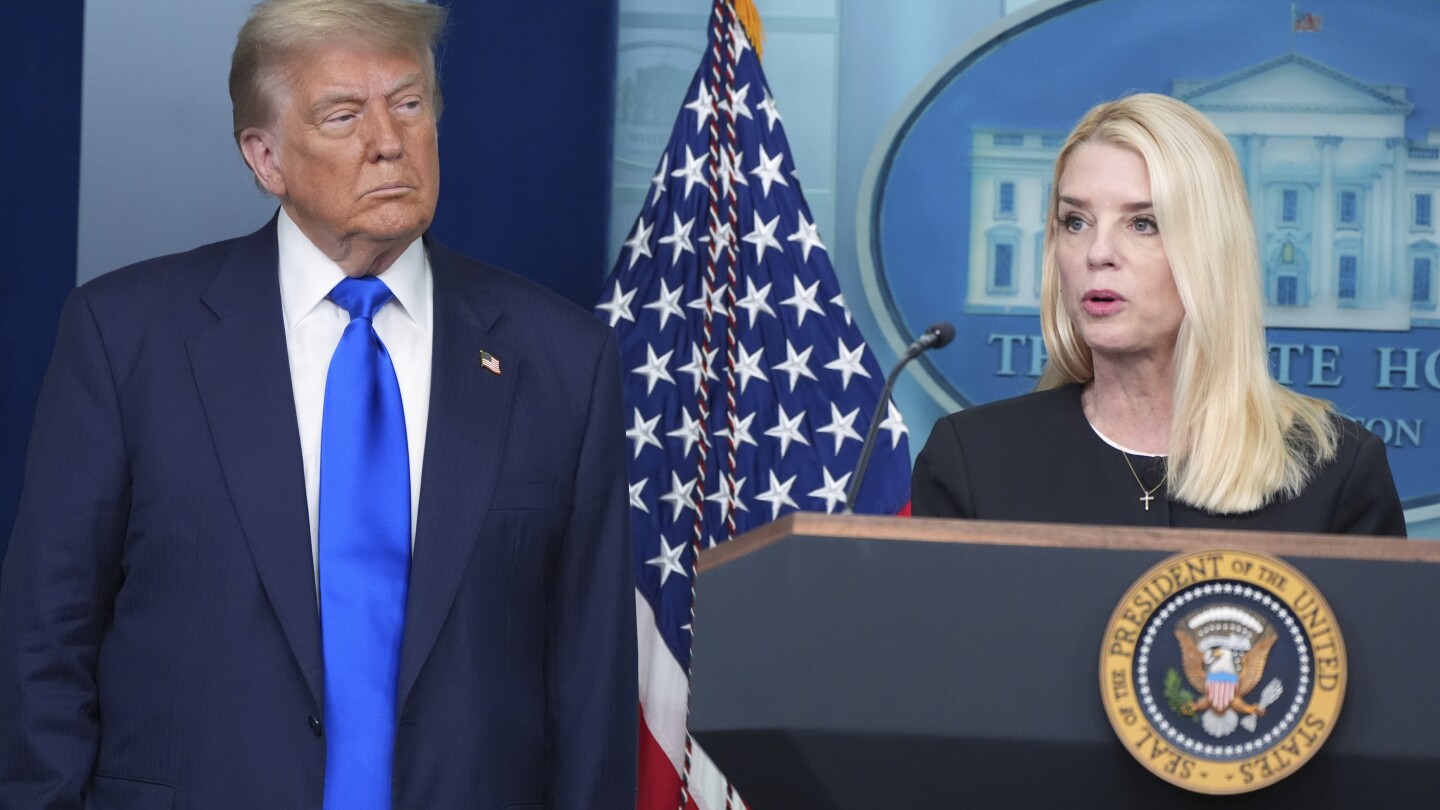
Eight months into his second term, President Donald Trump’s long-standing pledge to take on those he perceives as his political enemies has prompted debates over free speech, media censorship and political prosecutions.
From late-night comedian Jimmy Kimmel’s suspension to Pentagon restrictions on reporters and an apparent public appeal to Attorney General Pam Bondi to pursue legal cases against his adversaries, Trump has escalated moves to consolidate power in his second administration and root out those who have spoken out against him.
In a post on social media this weekend addressed to Bondi, Trump said “nothing is being done” on investigations into some of his foes.
“We can’t delay any longer, it’s killing our reputation and credibility,” he said. Noting that he was impeached and criminally charged, “JUSTICE MUST BE SERVED, NOW!!!”
Criticizing investigations into Trump’s dealings under Democratic President Joe Biden’s Justice Department, Sen. Rand Paul, R-Ky., said Sunday that “it is not right for the Trump administration to do the same thing.”
Directive to Bondi to investigate political opponents
Trump has ratcheted up his discussion of pursuing legal cases against some of his political opponents, part of a vow for retribution that has been a theme of his return to the White House. He publicly pressed Bondi this weekend to move forward with such investigations.
Trump posted somewhat of an open letter on social media Saturday to his top prosecutor to advance such inquiries, including a mortgage fraud probe into New York Attorney General Letitia James and a possible threat case against former FBI Director James Comey.
He posted that he had “reviewed over 30 statements and posts” that he characterized as criticizing his administration for a lack of action on investigations.
“We have to act fast — one way or the other,” Trump told reporters later that night at the White House. “They’re guilty, they’re not guilty — we have to act fast. If they’re not guilty, that’s fine. If they are guilty or if they should be charged, they should be charged. And we have to do it now.”
Trump later wrote in a follow-up post that Bondi was “doing a GREAT job.”
Paul, a frequent Trump foil from the right, was asked during an interview on NBC’s “Meet the Press” about the propriety of a president directing his attorney general to investigate political opponents. The senator decried “lawfare in all forms.”
Sen. Chris Murphy, D-Conn., said it was “unconstitutional and deeply immoral for the president to jail or to silence his political enemies.” He warned it could set a worrisome precedent for both parties.
“It will come back and boomerang on conservatives and Republicans at some point if this becomes the norm,” Murphy told ABC’s “This Week.”
The Senate’s Democratic leader, Chuck Schumer of New York, said on BLN’s “State of the Union” that Trump is turning the Justice Department “into an instrument that goes after his enemies, whether they’re guilty or not, and most of them are not guilty at all, and that helps his friends. This is the path to a dictatorship. That’s what dictatorships do.”
The Justice Department did not respond Sunday to a message seeking comment.
Appointment of new prosecutor in Letitia James investigation
Each new president nominates his own U.S. attorneys in jurisdictions across the country. And Trump has already worked to install people close to him in some of those jobs, including former Fox News host Jeanine Pirro in the District of Columbia and Alin Habbahis former attorney, in New Jersey.
Trump has largely stocked his second administration with loyalists, continuing Saturday with the nomination of a White House aide as top federal prosecutor for the office investigating James, a longtime foe of Trump.
Trump announced Lindsey Halligan to be the U.S. attorney in the Eastern District of Virginia on Saturday, just a day after Erik Siebert resigned from the post and Trump said he wanted him “out.”
Trump said he was bothered that Siebert had been supported by the state’s two Democratic senators.
“There are just two standards of justice now in this country. If you are a friend of the president, a loyalist of the president, you can get away with nearly anything, including beating the hell out of police officers,” Murphy said, mentioning the defendants in the Jan. 6, 2021, riot at the U.S. Capitol pardoned by Trump as he returned to office. “But if you are an opponent of the president, you may find yourself in jail.”
New restrictions on Pentagon reporters
Trump has styled himself as an opponent of censorship, pledging in his January inaugural address to “bring free speech back to America” and signing an executive order that no federal officer, employee or agent may unconstitutionally abridge the free speech of any American citizen.
Under a 17-page memo distributed Friday, the Pentagon stepped up restrictions on the mediasaying it will require credentialed journalists to sign a pledge to refrain from reporting information that has not been authorized for release, including unclassified information. Journalists who don’t abide by the policy risk losing credentials that provide access to the Pentagon.
Asked Sunday if the Pentagon should play a role in determining what journalists can report, Trump said, “No, I don’t think so.”
“Nothing stops reporters. You know that,” Trump told reporters as he left the White House for Charlie Kirk’s memorial service.
Trump has sued numerous media organizations for negative coverage, with several settling with the president for millions of dollars. A federal judge in Florida tossed out Trump’s $15 billion defamation lawsuit against The New York Times on Friday.
Jimmy Kimmel ouster and FCC warning
Perhaps the most headline-grabbing situation involves ABC’s indefinite suspension Wednesday of veteran comic Jimmy Kimmel’s late-night show. What he said about Kirk’s killing had led a group of ABC-affiliated stations to say it would not air the show and provoked some ominous comments from a top federal regulator.
Host Jimmy Kimmel speaks at the Oscars in Los Angeles on Feb. 26, 2017. (Photo by Chris Pizzello/Invision/AP, File)
Host Jimmy Kimmel speaks at the Oscars in Los Angeles on Feb. 26, 2017. (Photo by Chris Pizzello/Invision/AP, File)
Trump celebrated on his social media site: “Congratulations to ABC for finally having the courage to do what had to be done.”
Earlier in the day, the Federal Communications Commission chairman, Brendan Carrwho has launched investigations of outlets that have angered Trump, said Kimmel’s comments were “truly sick” and that his agency has a strong case for holding Kimmel, ABC and network parent Walt Disney Co. accountable for spreading misinformation.
“We can do this the easy way or the hard way,” Carr said. “These companies can find ways to take action on Kimmel or there is going to be additional work for the FCC ahead.”
Sen. Markwayne MullinR-Okla., argued that Kimmel’s ouster wasn’t a chilling of free speech but a corporate decision.
“I really don’t believe ABC would have decided to fire Jimmy Kimmel over a threat,” he said Sunday on BLN. “ABC has been a longstanding critic of President Trump. They did it because they felt like it didn’t meet their brand anymore.”
Not all Republicans have applauded the move. On his podcast Friday, GOP Sen. Ted Cruz of Texas called it “unbelievably dangerous for government to put itself in the position of saying we’re going to decide what speech we like and what we don’t, and we’re going to threaten to take you off air if we don’t like what you’re saying.”
Trump called Carr “a great American patriot” and said Friday that he disagreed with Cruz.
___
Kinnard can be reached at http://x.com/MegKinnardAP.
The Dictatorship
Hegseth imposes new press restrictions, eyes greater Pentagon control over access
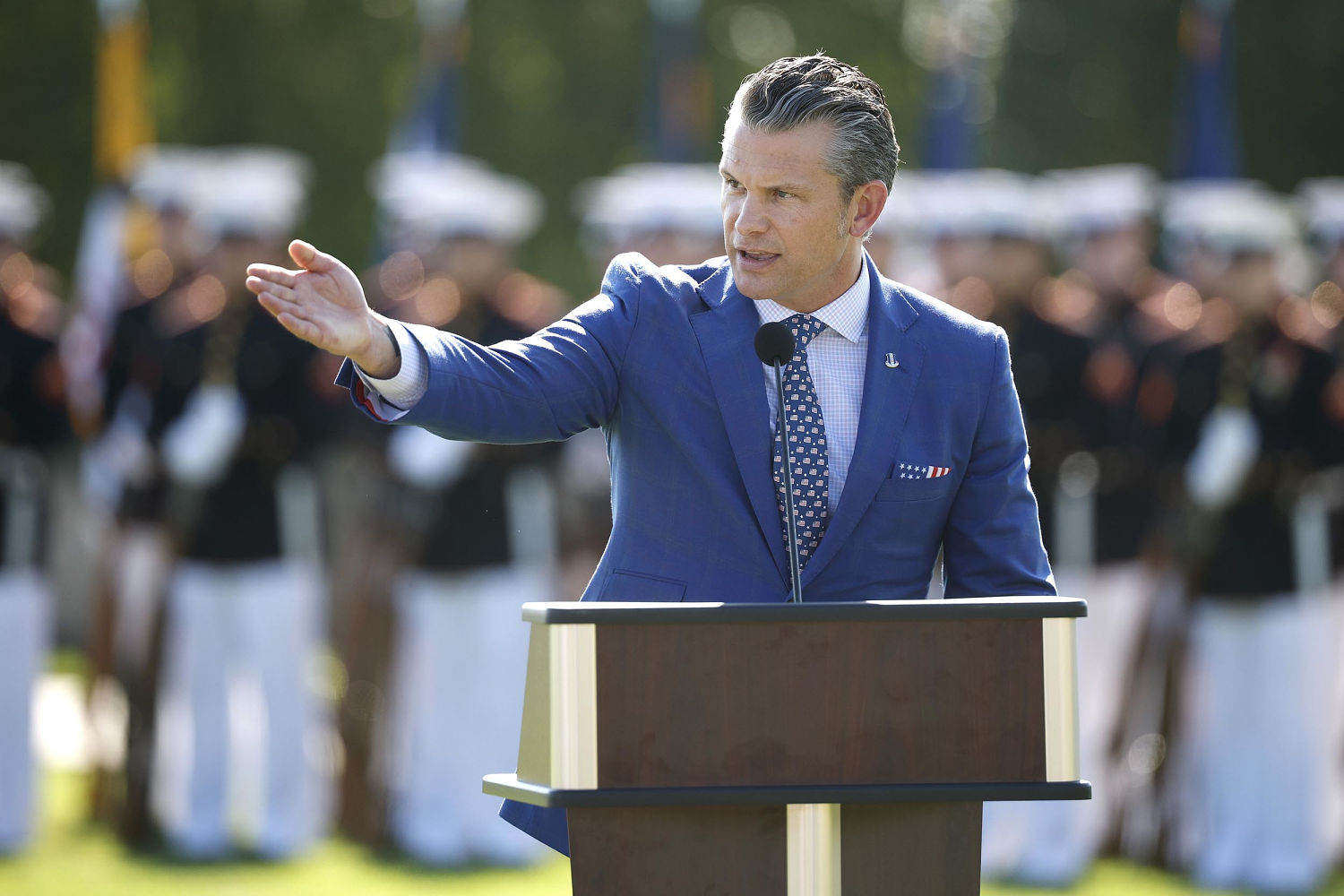
During a recent “expletive-laden address” at the Army War College, Defense Secretary Pete Hegseth boasted, “We are laser-focused on our mission of warfighting.” The former Fox News host did not, however, note that he was apparently referring to a domestic culture war.
During his tenure, the beleaguered Pentagon chief has invested a considerable amount of time and energy in library books. And paintings. And scrubbing Defense Department websites of articles and images about Jackie Robinson and the Navajo Code Talkers. And renaming Navy ships. And leading a Christian prayer service in the Pentagon’s auditorium. And amplifying videos about denying women the right to vote. And creating new grooming standards.
But in case that weren’t quite enough, Hegseth has also carved out time to push back against the industry he ostensibly worked in before joining the Trump administration: the news media.
As The Associated Press reported“The Pentagon this year has evicted many news organizations while imposing a series of restrictions on the press that include banning reporters from entering wide swaths of the Pentagon without a government escort — areas where the press had access in past administrations as it covers the activities of the world’s most powerful military.”
Late last week, these efforts took a dramatic turn for the worse. NBC News reported:
Journalists who cover the Defense Department at the Pentagon can no longer gather or report information, even if it is unclassified, unless it’s been authorized for release by the government, defense officials announced Friday. Reporters who don’t sign a statement agreeing to the new rules will have their press credentials revoked, officials said.
I’m mindful of the fact that Donald Trump and his team have launched a radical offensive against the First Amendment and its protections for the free press, but that doesn’t make the developments at the Pentagon any less ridiculous.
Sen. Jack Reed, D-R.I., a military veteran and ranking member on the Senate Armed Services Committee, called the restrictions “an ill-advised affront to free speech and freedom of the press.”
“Secretary Hegseth’s restrictions on the press are part of a broader attempt by this Administration to cover up missteps, stifle independent journalism, and obscure the truth,” Reed said. “American journalists are not, should not, and must not be mere stenographers for the party in power or the Pentagon itself.”
The senator’s use of the word “stenographers” was especially notable because it summarized the underlying problem nicely: Hegseth’s policyfor all intents and purposes, requires professional journalists to publish only what the Defense Department has approved for public release.
That might very well make the secretary happy and improve his job security — Hegseth has been humiliated in recent months from revelations that emerged from sources within the Pentagon — but this isn’t how things are supposed to work in the United States.
Even some Republicans acknowledged the absurdity of the demand.
Rep. Don Bacon of Nebraska, whose looming retirement seems to have made it easier for the congressman to speak candidly, wrote online“This is so dumb that I have a hard time believing it is true. We don’t want a bunch of Pravda newspapers only touting the Government’s official position. A free press makes our country better. This sounds like more amateur hour.”
Whether the pushback prompts a change in direction remains to be seen. Watch this space.
Steve Benen is a producer for “The Rachel Maddow Show,” the editor of MaddowBlog and an BLN political contributor. He’s also the bestselling author of “Ministry of Truth: Democracy, Reality, and the Republicans’ War on the Recent Past.”
The Dictatorship
Why Trump’s directive to AG Bondi should be seen as an impeachment-level scandal
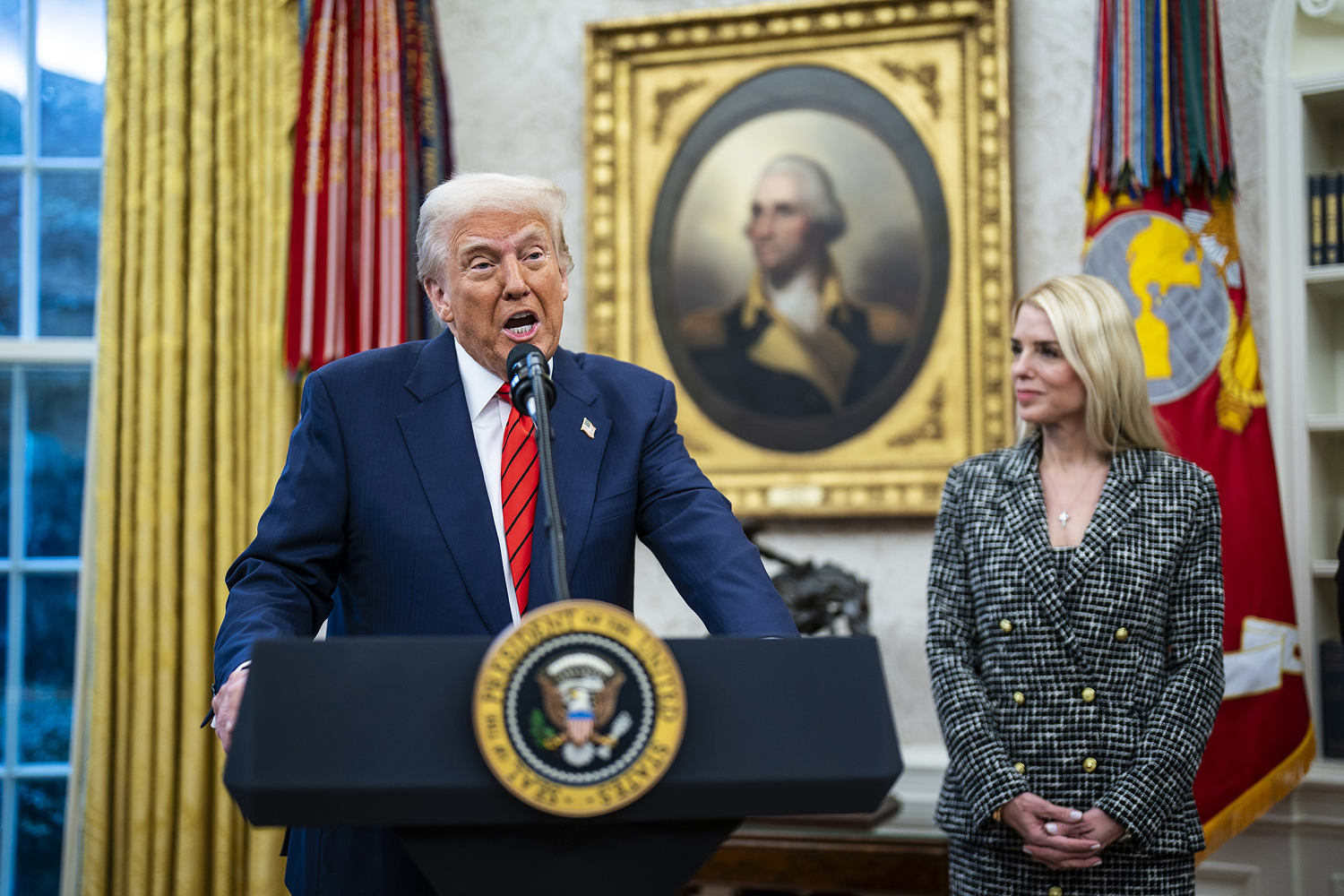
Imagine a scenario in which an investigative reporter uncovered a secret document from the White House. The document, in this hypothetical, showed Donald Trump quietly directing his attorney general to manufacture criminal cases against his political foes, without regard for evidence or propriety, as part of a brazenly corrupt and overtly authoritarian scheme.
In this scenario, the investigative reporter who obtained this secret document would, in a normal and healthy democracy, have a scoop for the ages. The public exposure of such a document would instantly become the kind of story that would rock the political system, spark heated congressional hearings and generate questions about possible resignations.
But in 2025, there’s apparently no need for an investigative reporter to uncover a clandestine plot — because the president published his scheme online for all the world to see. The New York Times reported:
President Trump demanded on Saturday that his attorney general move quickly to prosecute figures he considers his enemies, the latest blow to the Justice Department’s tradition of independence. ‘We can’t delay any longer, it’s killing our reputation and credibility,’ Mr. Trump wrote in a social media post addressed to ‘Pam,’ meaning Attorney General Pam Bondi.
The online missive was head-spinning in its absurdity. Trump began his message, “I have reviewed over 30 statements and posts saying that, essentially, ‘same old story as last time, all talk, no action. Nothing is being done. What about Comey, Adam ‘Shifty’ Schiff, Leticia??? They’re all guilty as hell, but nothing is going to be done.’”
In other words, to hear the president tell it, he saw some “posts” from unnamed people who want some of Trump’s political adversaries to be punished, because they’re “guilty” of unidentified crimes, and these “posts” should necessarily spur action from the Justice Department, because the president said so.
Concluding that “they” impeached him and tried to hold him accountable for a variety of alleged felonies, the Republican concluded that he’s desperate to turn the tables on his enemies. “JUSTICE MUST BE SERVED, NOW!!!” he wrote.
In case that was too subtle, Trump spoke briefly with reporters soon after, one of whom asked whether he was criticizing Bondi for not having already gone after his domestic adversaries. “No, I just want people to act,” the president replied. “They have to act, and we want to act fast. … We have to act fast.”
The Times’ report added, “Even for a president who has shattered the traditional norms of maintaining distance from the Justice Department, Mr. Trump’s unabashedly public and explicit orders to Ms. Bondi were an extraordinary breach of prosecutorial protocols that reach back to the days following the Watergate scandal.”
The Watergate reference is notable in large part because it helps contextualize the gravity of the circumstances: Trump isn’t just being accused of trying to weaponize federal law enforcement, he’s publicly flaunting his efforts.
His online directive was, for all intents and purposes, a confession in which he freely acknowledged his guilt. “Yes, I admit that I’m pressuring my attorney general to prosecute my political foes,” the president effectively declared. “And I’d prefer it if she hurried up and satisfied my hunger for revenge sooner rather than later.”
There’s no precedent in the American tradition for such explicit corruption of the rule of law. It is the stuff of impeachment resolutions. It is a brazen display of a desperate man who believes he’s both above the law and freed from the burdens of accountability.
Steve Benen is a producer for “The Rachel Maddow Show,” the editor of MaddowBlog and an BLN political contributor. He’s also the bestselling author of “Ministry of Truth: Democracy, Reality, and the Republicans’ War on the Recent Past.”
-
Uncategorized10 months ago
Bob Good to step down as Freedom Caucus chair this week
-

 The Josh Fourrier Show11 months ago
The Josh Fourrier Show11 months agoDOOMSDAY: Trump won, now what?
-

 Politics7 months ago
Politics7 months agoFormer ‘Squad’ members launching ‘Bowman and Bush’ YouTube show
-

 The Dictatorship7 months ago
The Dictatorship7 months agoPete Hegseth’s tenure at the Pentagon goes from bad to worse
-

 Politics11 months ago
Politics11 months agoWhat 7 political experts will be watching at Tuesday’s debate
-

 The Dictatorship7 months ago
The Dictatorship7 months agoLuigi Mangione acknowledges public support in first official statement since arrest
-

 Politics11 months ago
Politics11 months agoHow Republicans could foil Harris’ Supreme Court plans if she’s elected
-

 Politics7 months ago
Politics7 months agoBlue Light News’s Editorial Director Ryan Hutchins speaks at Blue Light News’s 2025 Governors Summit



